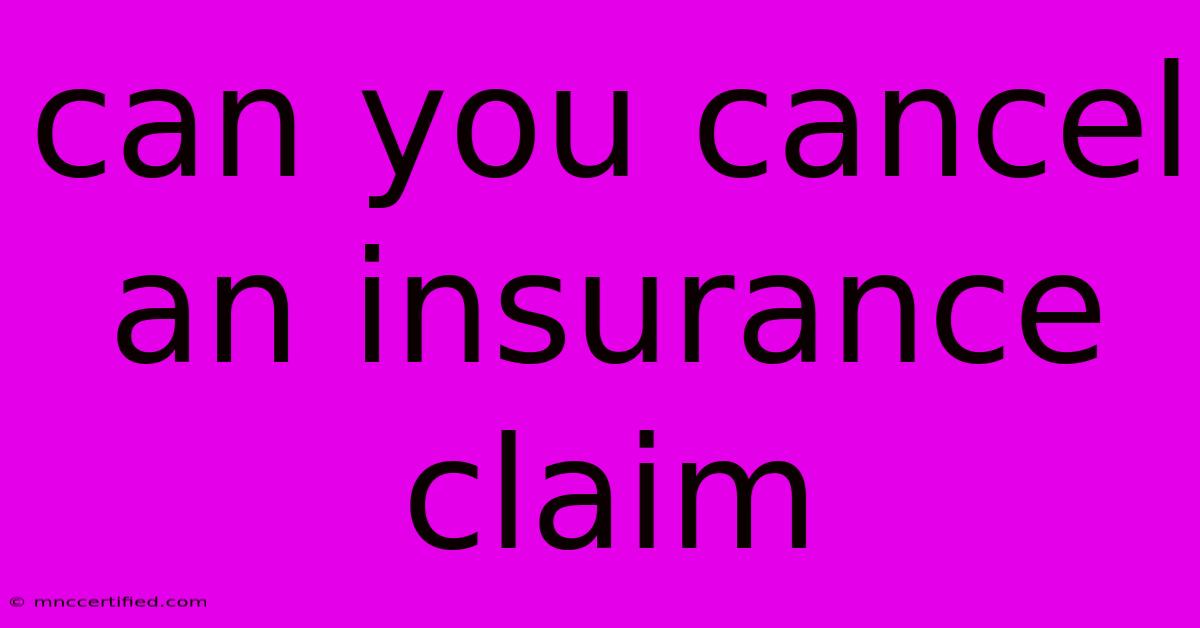Can You Cancel An Insurance Claim

Table of Contents
Can You Cancel an Insurance Claim? A Comprehensive Guide
So, you filed an insurance claim, but things have changed. Maybe you found a cheaper solution, the damage wasn't as bad as you thought, or you've simply had a change of heart. The question is: can you cancel an insurance claim? The answer, unfortunately, isn't a simple yes or no. It depends on several factors, including your insurance provider, the type of claim, and the stage of the claims process.
Understanding the Claim Process and Cancellation Options
Before diving into the specifics, it's crucial to understand that insurance claims aren't easily reversed. The process typically involves investigations, assessments, and potentially, payouts. The further along the process you are, the harder it becomes to withdraw your claim.
Factors Affecting Claim Cancellation:
- Type of Claim: A simple claim for a minor car scratch is much easier to withdraw than a complex claim involving significant property damage or a serious injury.
- Stage of the Claim: Cancelling a claim before the insurer begins its investigation is significantly easier than doing so after repairs have been authorized or payments have been made.
- Insurance Provider: Each insurance company has its own policies and procedures regarding claim withdrawals. Some are more flexible than others. Contacting your provider directly is crucial.
- Documentation: Be prepared to provide documentation justifying your request to cancel. This might include revised estimates of damages, proof of alternative solutions, or a clear explanation of your reasons.
How to Cancel an Insurance Claim
The process for cancelling an insurance claim is not standardized. However, here's a general approach:
- Contact Your Insurance Company Immediately: The sooner you act, the better. Call your insurer directly and clearly state your intention to withdraw your claim. Be polite but firm.
- Provide a Reason for Cancellation: Explain why you want to withdraw the claim. Be honest and transparent. A clear explanation will facilitate a smoother process.
- Request Confirmation in Writing: Don't rely on verbal agreements. Always request written confirmation that your claim has been withdrawn and what, if any, impact this will have on your policy (premiums, deductibles, future claims).
- Keep Records: Maintain copies of all communication (emails, letters, call logs) related to the cancellation of your claim. This documentation will be crucial if any issues arise later.
Potential Consequences of Cancelling a Claim
While you can typically cancel a claim, there may be consequences:
- Impact on Future Claims: Cancelling a claim might affect your future claims. Some insurers may view frequent claim withdrawals negatively.
- Increased Premiums: Although unlikely for a single instance, repeatedly withdrawing claims might lead to higher premiums.
- Loss of Benefits: If you've already received some benefits (like temporary repairs), you may be required to reimburse the insurance company.
When You Shouldn't Cancel a Claim
There are situations where cancelling a claim might not be advisable:
- Significant Damage: If the damage is substantial, cancelling the claim could leave you financially responsible for significant repair costs.
- Potential for Legal Action: If the damage involves a third party, cancelling your claim could leave you vulnerable to legal action.
- Uncertain Future Costs: If the full extent of the damage is unclear, it's best to proceed with the claim to avoid unexpected expenses later.
Frequently Asked Questions (FAQs)
Q: Can I cancel a claim after repairs have begun? A: It's significantly more difficult, but sometimes possible. Contact your insurer immediately to discuss your options.
Q: Will cancelling a claim affect my insurance premiums? A: It's unlikely to affect your premiums for a single instance, but repeated cancellations might.
Q: What if my insurer refuses to cancel my claim? A: You may need to escalate the issue through formal channels, such as contacting your state's insurance department.
Conclusion:
Cancelling an insurance claim is possible, but the process and potential consequences vary. Understanding the factors involved and following the correct procedure is essential to minimize any negative impacts. Always contact your insurance company directly and obtain confirmation in writing. Remember to carefully weigh the pros and cons before deciding to cancel your claim. Transparency and prompt action are key to a smooth process.

Thank you for visiting our website wich cover about Can You Cancel An Insurance Claim. We hope the information provided has been useful to you. Feel free to contact us if you have any questions or need further assistance. See you next time and dont miss to bookmark.
Featured Posts
-
Luke Evans Saturday Kitchen Rule Break
Nov 23, 2024
-
East Enders Star Lacey Turner Exits
Nov 23, 2024
-
Is Massage Covered By Insurance
Nov 23, 2024
-
Controlled Blast Near London Embassy
Nov 23, 2024
-
Hanekom Aims For Springbok Debut
Nov 23, 2024